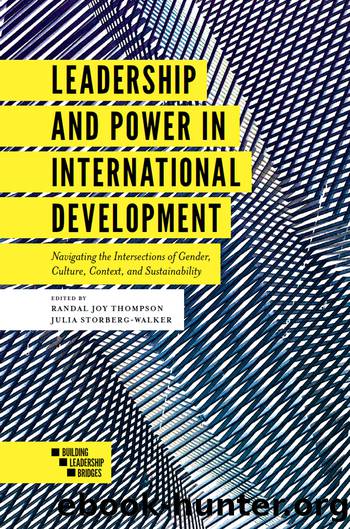Leadership and Power in International Development by Thompson Randal Joy;Storberg-Walker Julia;

Author:Thompson, Randal Joy;Storberg-Walker, Julia;
Language: eng
Format: epub
Publisher: Emerald Publishing Limited
Published: 2018-10-09T00:00:00+00:00
LEARNING TO LEAD
Learning to lead is a lifelong process. From the start, my biggest mistake has been believing that everyone working in international development has positive intentions. In reality, it is like any other field. Some people choose this work because their heart is in the cause; others elect it for more self-serving reasons. Further, international development emerged from colonialism and these roots remain embedded in the field. I have had colleagues who maintain that colonial mindset of âsaving the nativesâ who are perceived as too primitive to save themselves, while they indulge in a life of luxury. It is hard for me to believe that these patronizing attitudes, paternalistic efforts, and imperialist goals are still seen as acceptable, but I encounter them in each and every country in which I work repeatedly and consistently. It is difficult to navigate the toxicity that comes from some of the attitudes and selfish actions in this field, and even more difficult when a person in a leadership role is oblivious to those attitudes. Once a colleague from the Global North actually said, âthe problem is the Ethiopians cannot think for themselves.â I was so shocked and appalled by this comment that I could not gather my thoughts fast enough to respond. I should have recognized this manâs racism long before this comment, but I was naïve and embedded in my own privilege, not realizing his level of bias because his bias did not directly impact me. I still assume positive intentions among my colleagues, but with caution and awareness that I may not be seeing their authentic selves. I remember that I am allotted certain privileges as a white, well-educated, and financially well-compensated individual from the Global North and need be acutely aware of imbalances of power. I pay attention to micro-aggressions and I seek feedback from national staff and project participants to ensure that my privileged position is not obscuring my perceptions. There is no room for any hierarchy on my teams, especially not one founded on discrimination and prejudice. I strive to create an environment with an equitable balance of power, where all team members participate in decision-making, where local knowledge is valued as guiding knowledge and we truly see, understand, and respect each other.
Burnout has been another challenge. When I am working directly in conflict zones or resource poor environments, I guard myself against burnout, vigilantly focusing on self-care and managing stress. But in environments where stress is less obvious, burnout creeps up on me like a stress fracture. In 2016, I spent six months leading a technical project in the Syria response. When I was undertaking this work, I did not realize I was struggling. After all, my project was going well and I spent most of my time in an air-conditioned office in Amman, Jordan. I counted myself as fortunate and never entertained the thought the situation may be creating excessive and damaging stress. But I was working on child marriage prevention and response, every day grappling
Download
This site does not store any files on its server. We only index and link to content provided by other sites. Please contact the content providers to delete copyright contents if any and email us, we'll remove relevant links or contents immediately.
International Integration of the Brazilian Economy by Elias C. Grivoyannis(72370)
The Radium Girls by Kate Moore(11589)
Turbulence by E. J. Noyes(7679)
Nudge - Improving Decisions about Health, Wealth, and Happiness by Thaler Sunstein(7215)
The Black Swan by Nassim Nicholas Taleb(6737)
Rich Dad Poor Dad by Robert T. Kiyosaki(6154)
Pioneering Portfolio Management by David F. Swensen(6053)
Man-made Catastrophes and Risk Information Concealment by Dmitry Chernov & Didier Sornette(5620)
Zero to One by Peter Thiel(5464)
Secrecy World by Jake Bernstein(4360)
Millionaire: The Philanderer, Gambler, and Duelist Who Invented Modern Finance by Janet Gleeson(4065)
The Age of Surveillance Capitalism by Shoshana Zuboff(3966)
Skin in the Game by Nassim Nicholas Taleb(3954)
The Money Culture by Michael Lewis(3818)
Bullshit Jobs by David Graeber(3804)
Skin in the Game: Hidden Asymmetries in Daily Life by Nassim Nicholas Taleb(3711)
The Dhandho Investor by Mohnish Pabrai(3544)
The Wisdom of Finance by Mihir Desai(3510)
Blockchain Basics by Daniel Drescher(3309)
